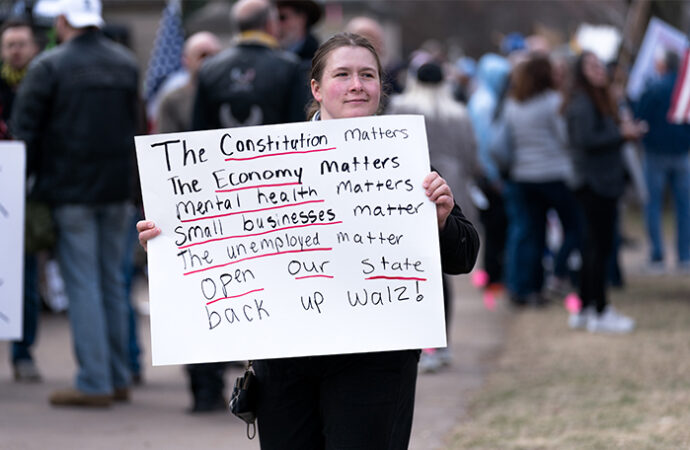Here comes big brother.
Never willing to let a serious crisis go to waste, big government advocates have launched many programs designed to alleviate the effects of coronavirus. These touch both the physical and economic spheres of Americans’ lives.
At time of writing, all or parts of 45 states are under some form of “Stay at Home” order, keeping 316 million Americans home except to buy essentials. These orders spread quickly, beginning with California on March 20, and expanding to 30 states by March 30.
The $1,200 stimulus checks are in the mail, appeasing those struggling to make ends meet because the government has shuttered their places of employment.
The $2 trillion government solution to the government-caused problem is far from enough for some politicians, however. U.S. Rep. Tim Ryan of Ohio is one of these. He introduced a bill to provide Americans with $2,000 a month “until employment levels reach pre-coronavirus levels.” Ryan’s bill would cover every American age 16 and older who earns less than $130,000 annually.
Orders are more strict as well. Michigan residents are now subject to an arbitrary set of guidelines preventing them from buying paint, building supplies, and gardening equipment, under the generic label of nonessential products. As Gov. Gretchen Whitmer made very clear, “All public and private gatherings of any size are prohibited.”
The exercise of government power in the midst of a crisis raises a question: Will Americans suffer such power in their leaders when the coronavirus pandemic comes to an end?
Political philosopher Frank Meyer put the problem of government power of the economy very well in his essay “Collectivism Rebaptized”:
“Since power is the instrumentality of control by men and groups of men over other men and since in this imperfect world, in the end, the only check upon power is power, the division of power (both within the political sphere and between the political sphere and other spheres) and unceasing vigilance to keep it divided are the essential safeguards of freedom.
With this goes the other and corollary principle, a special case of the principle of division of power, but of the greatest importance: the entire sphere of economic activity must remain free of political control. For only the strict separation of the sources of a man’s material existence—property, employment, provision for illness and old age—from political institutions can enable him to maintain his independence of them. And further, if the state, which is the legal repository of force for the preservation of the conditions of peaceful civil life and for defense against external enemies, gains control over any other sphere of human activity, the very possibility of effective division of power is gone.”
Whitmer’s new order is one that delves into many spheres of human activity, and if it stands it will serve as evidence of the dissolution of the “effective division of power.” Never mind the guidelines of 10 or less, never mind the pretense of responsible attitudes in the midst of a pandemic. Will Americans accept this pretense as stretching so far as to justify a ban on families and direct neighbors visiting in small groups?
If there is no “strict separation” of Americans ability to live for and provide for themselves and their families, the United States may be headed to an unprecedented level of collectivism. There are divisions of power built into the U.S. Constitution, state constitutions, and the general order of any free society, but these divisions are only effective so long as those in power and those they govern are able to agree on them. If the people allow their leaders to ignore such separations, they will not last long in practice nor in written law.
Americans are starting to chafe under the burdens of government-led shutdowns. They are not remaining silent, as protests in in Michigan and other states show.
But will Americans be able to regain the measure of independence that we had before the coronavirus shutdown? Will these restrictions cause an awakening of the overreach of government in our lives generally? Or will Americans just meekly accept the dictates of the powers that rule them, and adapt themselves to this “new normal” of government involvement and surveillance in their lives?
—
[Image Credit: Flickr-Lorie Shaull, CC BY-SA 2.0]
Image Credit: [Image Credit: Flickr-Lorie Shaull, CC BY-SA 2.0]
















Leave a Comment
Your email address will not be published. Required fields are marked with *